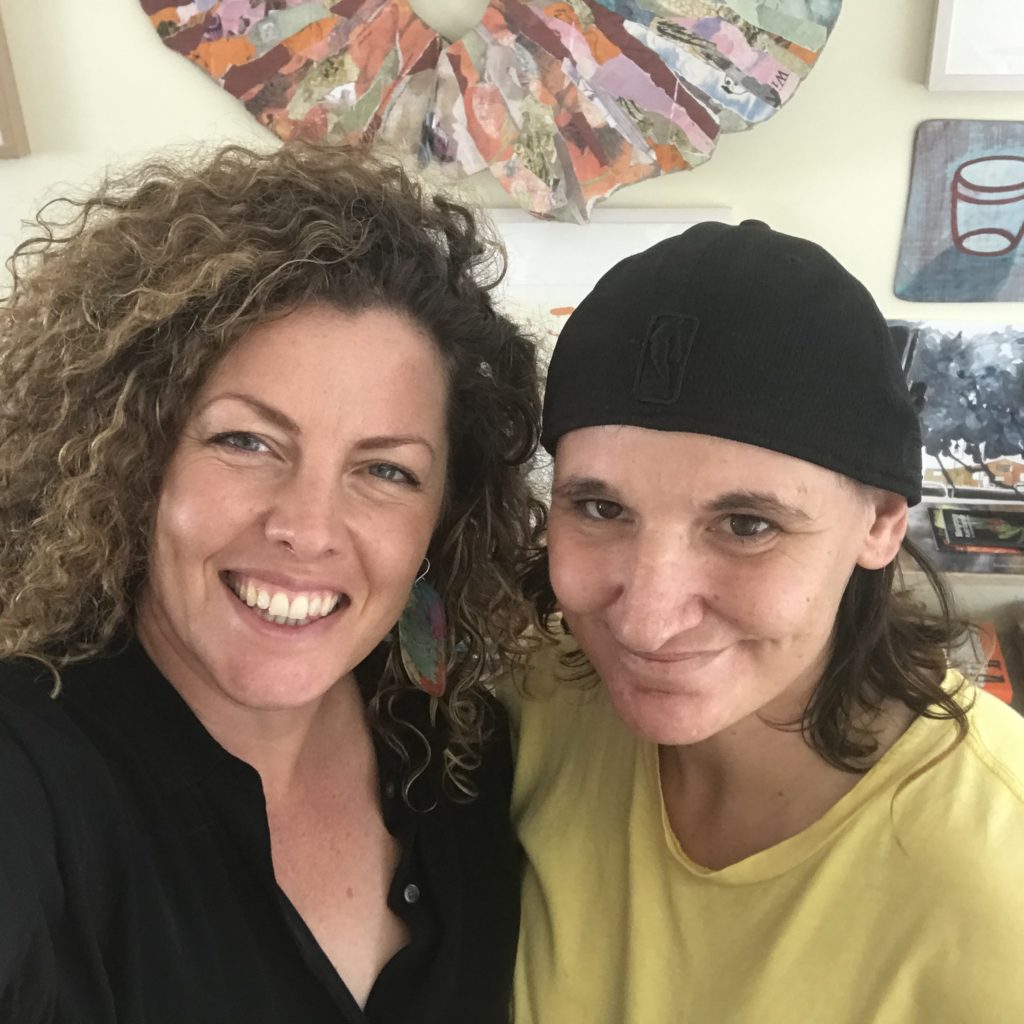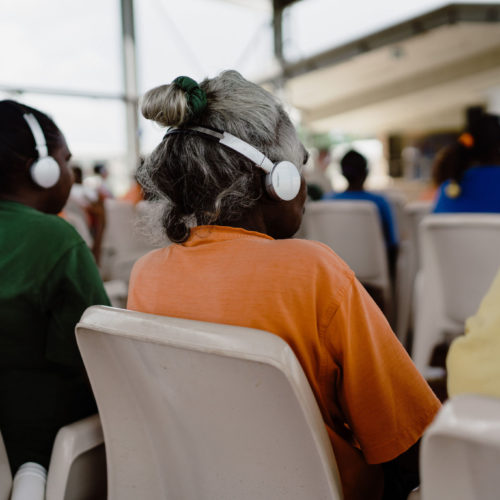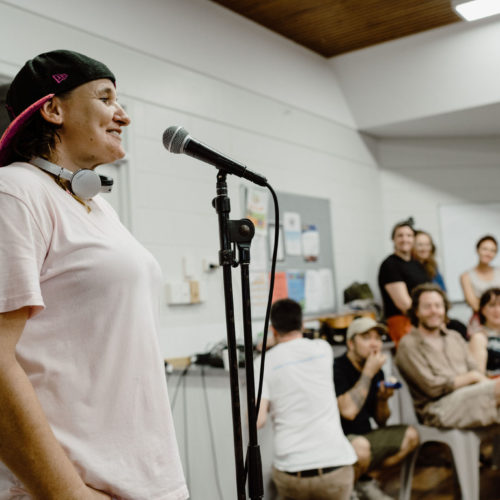Darwin-based advocate for women with lived experiences of incarceration and Birds Eye View key collaborator Rocket Bretherton, as well as award-winning author, producer and Birds Eye View executive producer Johanna Bell, join us for this edition of Working With Sound.
Birds Eye View is the first podcast made with women in the Darwin Correctional Centre, and recently won the ‘Podcast of The Year’ at the Australian Podcast Awards. They speak to us about the origins of Birds Eye View and the practical challenges of producing a podcast inside a prison.

How did you come to work on the Birds Eye View podcast?
Rocket: Because there were biscuits and hot chicks! Nah, the real reason is cause there’s no programs available for women in Darwin Correctional Centre. I was bored in there so I first went up for something to do. But then I got to like it. It grew on me and I stayed because I got excited about the chance to tell my story and be heard.
Johanna: In 2018, I was approached by the Northern Territory Government to run a storytelling project in the Darwin Prison. It was part of a broad suite of public health programs. In the beginning, we weren’t sure what kind of storytelling project it would be. Podcasting made sense because the women wanted to share their stories with people outside of prison. But some of the women who had been inside a long time hadn’t heard of podcasts. So the first step was to start a podcast club. We played Earhustle first, which the women loved, and then we played Going Home: Cristel’s Diary story from Radio Diaries. It’s about a woman who was pregnant when she went into prison and after giving birth, she had to give her child away. There were a lot of tears off the back of this podcast but also a sense of respect for the storyteller. And that’s when the group started to think seriously about making a podcast.
Where did the idea for Birds Eye View come from?
R: It was a group decision. We sat around throwing around ideas. A lot of us like writing poetry and playing with words. We chose the title cause we’re all jailbirds and we wanted to give people a new perspective on our lives.
J: I remember the day when the ideas behind Birds Eye View took shape. We were in the library doing a brainstorm on big bits of cardboard. I asked the women to describe how they thought people on the outside saw them. The list of things was horrible: junkies, hoars, bad mothers, useless, ugly, worthless, a waste of space … you get the picture. Next to that list, the women wrote out things that others didn’t already know about them. There was one woman with a helicopter license, a state show jumping champion, a photographer, the lead singer of an all-female rock band, to name a few. The two lists couldn’t have been more different and from that came the three questions that would frame the podcast: Who are we really? How did we get here? Where to next?
Who are we really? How did we get here? Where to next?
What was your favourite part of making Birds Eye View?
Who are we really? How did we get here? Where to next?
R: Looking back, my overall favourite part was making two really good friends in Yo and Leah (the producers) and also having a chance to tell my story; to be heard and understood. It’s changed my entire life in a way I never thought was possible. I’ve got so much more in my life now than drugs. I’ve replaced drugs with something way fucking better – all the podcast stuff and the speaking opportunities that have come from it. People look up to me now. Like the other day, at the pub, these chicks came up and asked if I was Rocket. They started saying how much they love the podcast and how much I’ve inspired them. What I said in the podcast was that my life would be worth it if I could help just one person but through this, I’ve helped heaps more than that and I want to keep going.
J: It’s really hard to pick one thing because it took two years to make Birds Eye View and there were lots of memorable moments. I really enjoyed watching the women build their audio confidence -like Naomi – she was super shy and whenever the mic came her way, she’d dissolve into giggles. Then, after about six weeks, we were chatting about birds and she started to tell us about her dreaming, the pelican. Everyone went really quiet and still (which is a very rare thing in a prison). No one dared move because we all knew what a big thing it was for her to be recording on mic. Two weeks later, Naomi shared her story and later still, she helped edit it into the version you hear on episode seven.
I also loved the way that the women took control of the podcast and reshaped the format. What started out as a straight storytelling podcast quickly became a mix of satire, poetry, interviews and audio essays. That’s the magic about collaboration and slow storytelling. Once we’d established some trust and the women had the audio skills, they took the sound where they wanted it to go. Which was way more interesting than what we would have done without their input!
Speaking of sound, one of my favourite things was working with Caiti Baker (Settle Down Sisters) and James Mangohig (SkinnyFish Records) to create the theme music for the podcast. We wanted the music to transport people into the prison so we built it using field recordings that the women recorded inside. One of the women we worked with, Taise, was a drummer on the outside, so we kitted her up with a zoom that had the metronome going and she recorded more than 70 beats made with things from inside prison. Things like doors opening and closing, footsteps, taps turning on and off, microwave doors, the chain mail fence and some random almonds that Taise dropped on a table. Then James sampled them, along with field recordings and body percussion to create the haunting backdrop to the podcast.

What was the biggest challenge?
R: Trust. 100 per cent the biggest challenge was trust. I’ve grown up not trusting anyone and Yo and Leah were saying ‘Trust us. You’ll get a say at how the story ends,’ but I didn’t believe it. I was scared about what would come out. That changed when I heard my story played back for the first time and Yo and Leah gave me a chance to change stuff. That’s when I started to trust that I was actually going to get to tell my story in my way.
J: The biggest challenge for me was managing the weightiness that comes with a project like this. When you’re working to elevate voices in a system designed to disempower and dehumanise, meeting expectations can be overwhelming. I often felt sandwiched between my commitment to the podcast participants and the bureaucratic restraints of the corrective system. Looking back, I was afraid that someone at the top of the food chain, would become risk adverse and shut the project down. I was terrified that all the courage and hard work the women had put in would come to nothing. We had a couple of close calls but thankfully that didn’t eventuate and for the most part, NT Corrections were supportive of the project. I did end up with compassion fatigue at the end of the project and if I did it again, I’d definitely get some proper supervision from the outset.
What’s the best (or worst) advice you’ve received about podcasting?
R: The best advice was don’t expect too much. Yo told me that and it was good because I didn’t know what to expect. She said we might get a few downloads – four or five thousand so I wasn’t expecting much but fuck me, last time I looked, we were at 166,000 downloads and we just won Australian Podcast of the Year!
J: Lots of people have told me that to be a good podcaster you need to listen to lots of podcasts. I’ve got mixed feelings about this. It’s true that when I listen to other podcasts, I get ideas about how I could shape my own work but I also hear a lot of things being done over and over again. We’ve had a lot of feedback that people liked Birds Eye View because it doesn’t conform to the ‘norms’ of podcasting and I wonder if that’s because with the exception of our gun-producers, Cinnamon Nippard and Hamish Robertson, none of the contributors come from an audio background. I wonder if this is what gave us a chance to approach the structure and sound from a new angle.

Do you think the podcast you made reflects your personality? If so – in which ways?
R: 100 per cent it does. You get to know me a little bit. You hear my cheeky side and a more serious side that doesn’t come out too often. With the magazine style, you’ve got a lot of chopped up bits and lots of fun. That’s pretty much what I’m like.
J: The whole point of the podcast was to challenge stereotypes about who ends up in prison so I hope that the podcast doesn’t reflect any one personality but rather, a range of voices. That said, I tend to gravitate towards multiplicity and complexity so in that way the format, with its choral hosting and eclectic segments is a reflection of me.
What would you like to hear more of in Australian audio?
R: I want to hear more stuff that changes the system; more audio that gives people a chance to look into the lives of those who don’t get seen or heard. And more of Rocket!
J: I want to hear more unconventional voices and more collaborations with storytellers from other forms – poets, musicians, film makers, novelists. What would happen if a composer teamed up with a deaf poet? What would it sound like if a long-form narrative series was told in two languages? How would you soundscape a storytelling podcast with renal patients who spend half their life on dialysis? These are some of the things I think about and wish there was more funding to support.
If you could go out to dinner with any audio maker, who would it be – and what would you talk about?
R: Well, we haven’t had our bottle of champagne to celebrate the Australian Podcast of the Year Awards yet, so I’d pick Yo and we’d talk about how I told her that we were going to win the gold and she didn’t believe me. So she would have to shout the bottle of Dom Pérignon.
J: I love a mixed bag of lollies so I’d probably go for a dinner with people from all walks … Rocket (of course!), Marc Fennel, Kaitlin Prest, Cinnamon Nippard, Beccy (from Sector Four), Earlonne Woods, Helen Zaltzman, Roslyn Oades, and my mate from SPUN Stories, Jess Ong. What would we talk about? Who knows but it would be fascinating and very funny.
What motivates you to make audio?
R: The chance to make a difference in the criminal justice sector and change people’s opinions.
J: Meeting people who aren’t me and injecting new voices into the national narrative.
What next?
R: I’m hoping to make another podcast. It’s called Recovering Rocket and it’s an up close look at life as a recovering drug addict. I’m working on some early ideas and I’ve started a Go Fund Me to support the project.
J: I’m not sure. At the moment, I’m running poetry workshops with women in Sector Four and doing a lot of writing. 2020 has been such a weird year. It feels like things are still in flux but I guess I should probably start thinking about what next. I did wake up the other day with an idea for a new podcast but it’s a bit too embryonic to describe here.
You can listen to Birds Eye View here.